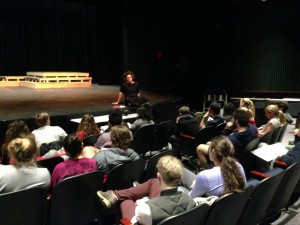
It would be naive to think that Shakespeare’s plays, and his comedies in particular, are not challenging for audiences. The language itself is foreign and the humor based on events that happened nearly 500 years ago. Directors are willing to put these difficulties aside because we are drawn to the way Shakespeare understands the human condition, but we can’t forget for a moment that audiences will never understand the truths Shakespeare illuminates unless actors have a clear vision of the entire world of the play.
In As You Like It, which is admittedly a play about ideas, it is even more critical. What do Touchstone’s jokes even mean? Why is Duke Senior such a nice guy? Why is Corin so bitter? Why is Jaques obsessed with Touchstone? Our actors must know the answers to these questions—amongst a host of others.
Luckily, Shakespeare scholar and UMass professor Dr. Adam Zucker came to illuminate some of these mysteries. His presentation, which was weighted equally with humor and practical advice, gave our actors terrific context in which to place Shakespeare’s play and characters.
Dr. Zucker explained the importance of the pastoral poem to As You Like It, the role of the clown in Shakespeare’s plays, and the subversive politics presented in the play. No presentation on Elizabethan England would be complete without a discussion of patriarchy which, in As You Like It, impacts relationships between brothers as well as between sexes.
After Dr. Zucker’s visit, the cast embarked on starting character work: the time when actors get to sort out who their characters are, what has shaped their vision of the world, and what they want most in life.
Armed with a new context in which to look at their roles, the characters became living, breathing, three-dimensional human beings, not sketches of characters written centuries ago.

